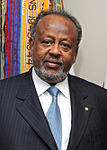The National Democratic Party is a political party in Djibouti. It was founded as an opposition party in 1992 by Aden Robleh Awaleh, who remains the party's president. It was part of the ruling coalition in 2005, but has since rejoined the opposition against President Ismaïl Omar Guelleh.

The Front for the Restoration of Unity and Democracy is a political party in Djibouti. It is aligned with the interests of the Afar people who live in that country, although it has supporters residing outside of Djibouti.

Elections to the European Parliament take place every five years by universal adult suffrage. 751 MEPs are elected to the European Parliament, which has been directly elected since 1979. No other EU institution is directly elected, with the Council of the European Union and the European Council being only indirectly legitimated through national elections. While Europarties have the right to campaign EU-wide for the European elections, campaigns still take place through national election campaigns, advertising national delegates from national parties.

Elections in Benin take place within the framework of a multi-party democracy and a presidential system. Both the President and the National Assembly are directly elected by voters, with elections organised by the Autonomous National Electoral Commission (CENA).

A parliamentary election was held in the Republic of the Congo on 24 June 2007, with a second round initially planned for 22 July 2007, but then postponed to 5 August 2007. According to the National Commission of the Organization of the Elections (CONEL), 1,807 candidates stood in the first round for 137 seats in the National Assembly. The ruling Congolese Labour Party and parties and independent candidates allied with it won 125 seats, while two opposition parties won a combined 12 seats.

A parliamentary election was held in Djibouti on 8 February 2008. There were 65 candidates running for the 65 seats in the National Assembly, with all of the candidates coming from the ruling coalition, the Union for the Presidential Majority (UMP). The opposition boycotted the election, and the UMP won all 65 seats.
Mohamed Ali Mohamed was a Djiboutian politician of the People's Rally for Progress (PDP).

Parliamentary elections were held in Niger on 20 October 2009, after President Mamadou Tandja dissolved the National Assembly in May 2009 and a constitution referendum was held in August 2009. The elections were boycotted by most opposition parties, and saw Tandja's National Movement for the Development of Society (MNSD) win a landslide victory.

The 2003 Djiboutian parliamentary election took place in Djibouti on 10 January 2003 to elect the National Assembly of Djibouti. The ruling coalition of President Ismail Omar Guelleh won all 65 seats in the election defeating an opposition coalition.

Legislative elections took place on 10 and 17 June 2012 to select the members of the 14th National Assembly of the French Fifth Republic – a little over a month after the French presidential election run-off held on 6 May.

A parliamentary election was held in the Gambia on 29 March 2012. The election was for 48 of 53 seats in the unicameral National Assembly, with five seats being appointed by the president.

Parliamentary elections were held in Djibouti on 22 February 2013. After their boycott of the 2008 elections, opposition groups contested the elections as the Union for National Safety alliance.

Early general elections were held in Luxembourg on 20 October 2013. The elections were called after Prime Minister Jean-Claude Juncker, at the time the longest serving head of government in the European Union, announced his resignation over a spy scandal involving the Service de Renseignement de l'Etat (SREL). The review found Juncker deficient in his control over the service.
René-Dambert Ndouane is a Congolese politician who served in the government of Congo-Brazzaville as Minister of Tourism from 1997 to 1999 and as Minister of Labour from 1999 to 2002. He was Second Vice-President of the National Assembly from 2002 to 2007 and First Vice-President of the National Assembly from 2012 to 2017.
Fernand Sabaye is a Congolese politician who has served as a Deputy in the National Assembly of Congo-Brazzaville since 2002.
Michel Bidimbou Pouela is a Congolese politician who has served as a Deputy in the National Assembly of Congo-Brazzaville since 2007.

Parliamentary elections were held in Burundi on 29 June 2015. The vote had been initially set for 5 June 2015, alongside local elections, but it was delayed due to unrest. Indirect elections to the Senate occurred on 24 July.
General elections were held in Morocco on 7 October 2016. The ruling Justice and Development Party remained the largest party, winning 125 of the 395 seats in the House of Representatives, a gain of 18 seats compared to the 2011 elections.
The first round of a by-election was held in Territoire de Belfort's 1st constituency on 28 January 2018, with a second round on 4 February because no candidate secured a majority of votes in the first round. The by-election was called due to the invalidation of the election of Ian Boucard, candidate of The Republicans (LR), in the June 2017 legislative elections by the Constitutional Council on 8 December 2017, due to the distribution of misleading electoral leaflets by Boucard's campaign between the two rounds.

Parliamentary elections are scheduled to be held in Cameroon in 2019. On 15 June 2018, the BBC obtained a letter from Cameroonian President Paul Biya to the leader of the country's senate, apparently seeking to delay the elections until October 2019. On 2 July, the parliament accepted and voted to extend its mandate by twelve months.














